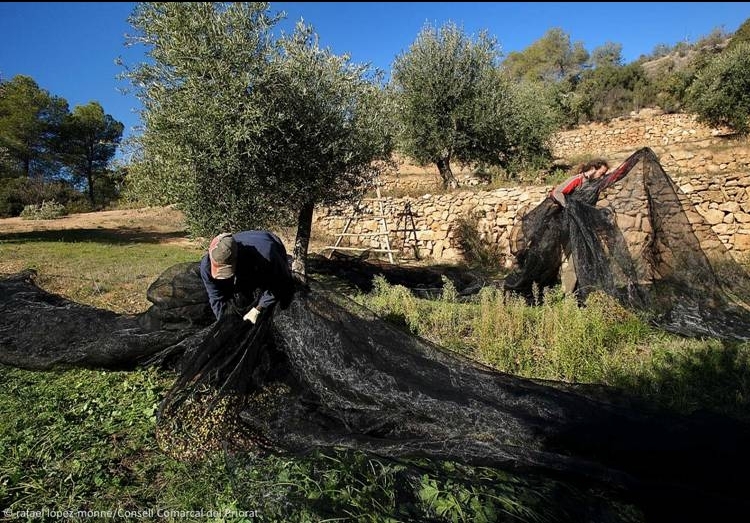Priorat Olive Oil Route
Besides wine, the other product that symbolises the Priorat is the olive oil. The cultivation of olives has been taking place for thousands of years in this area, either as a complementary crop to wine, or in certain villages of the region.
We would like to invite you to get to know how this extra virgin olive oil is made, its characteristics and the various oil mills or presses which make up the Olive Oil Route.

Details
| Countries and regions |
Spain - Catalonia |
|---|---|
Description Information in local language
La Ruta de l’oli del Priorat
L'altre producte emblemàtic del Priorat és l'oli. El conreu de l'olivera s’ha de tenir en consideració, ja que és present a les nostres terres des de fa milers d’anys, esdevenint un cultiu complementari de la vinya o, en algunes poblacions de la comarca, la principal producció agrícola.
El cultiu de l’olivera a la comarca del Priorat abasta una superfície de 3.500 ha, aproximadament. Hi predomina el cultiu de la varietat Arbequina, amb un 95 % del total de la producció, al costat d’altres varietats com la Farga i la Rojal.
Els olis del Priorat estan emparats sota la Denominació d'Origen Protegida Siurana.
Actualment, destaca el mètode de cultiu tradicional, però hi ha una clara tendència cap a procediments/sistemes de conreus integrats i ecològics, afavorits per la ubicació de bona part dels conreus en zones de muntanya.
Després d'un acurat control de les plagues i malalties del cultiu i una laboriosa recol·lecció, que es duu a terme de novembre a febrer, es procedeix a l'extracció del suc natural de l'oliva –l’oli verge extra– mitjançant sistemes continus i procediments mecànics que no modifiquen la seva composició i conserven, per tant, les seves característiques sensorials i les seves immillorables qualitats nutricionals i gastronòmiques. El termini per a la seva elaboració és de 24 hores des de la recollida manual. Posteriorment al procés d'extracció, l’oli reposa a les silencioses bodegues de les almàsseres.
L’oli resultant és equilibrat pel que fa als atributs amarg, picant i dolç, amb pronunciades aromes fruitades que recorden l'oliva de la qual provenen. En definitiva, un oli capaç de compartir plats i taula amb els millors vins, els trets diferencials de la nostra cuina prioratina.
Us convidem a conèixer el procés d’elaboració de l’oli i les seves característiques a través dels diversos molins que us proposem en aquesta ruta: un total de sis molins visitables on degustareu el millor oli d'oliva verge extra.
In the Priorat, cultivated olive trees cover an area of approximately 3,500 hectares. The predominant variety grown in the region is Arbequina, which forms 95% of the total production, together with other varieties such as Farga and Rojal. The total average production is 4,800 tons of olives and 950,000 kg of oil.
The olive oil of this district is marketed under the ‘Denominación de Origen Protegida Siurana’ or “Siurana Protected Designation of Origin”, a name which guarantees the place of origin of the product.
Today, traditional methods of cultivation predominate, although there is a clear tendency towards more organic procedures or systems. This is possibly due to the fact that most of the olives are grown in up in the mountains.
After careful control of pests and diseases and the hard work of harvesting the crop, which takes place from November to February, the next stage is the extraction of the natural juice of the olive –the extra virgin oil. This extraction process is based on a continuous system involving mechanical means which do not alter the composition of the product and preserves its particular characteristics and superb nutritional and gastronomic qualities. The whole process (collecting the olives by hand up until the final product), takes 24 hours. After the process of extraction of the oil is completed, it is left to settle in the silent cellars of the oil mills.
The resulting oil is well balanced in terms of sweetness, spiciness and bitterness and, together with the pronounced fruity aromas of the oils, echo the characteristic qualities of the olives from which they have been made. In short, these are oils that can take their place at table alongside the best wines as distinctive ingredients of Priorat cuisine.
We would like to invite you to get to know how this extra virgin olive oil is made, its characteristics and the various oil mills or presses which make up the Olive oil Route. In total we have six mills which are members of the route.
Links of interest
| Priorat Tourism Official Website |
| Priorat Region Pictures |

